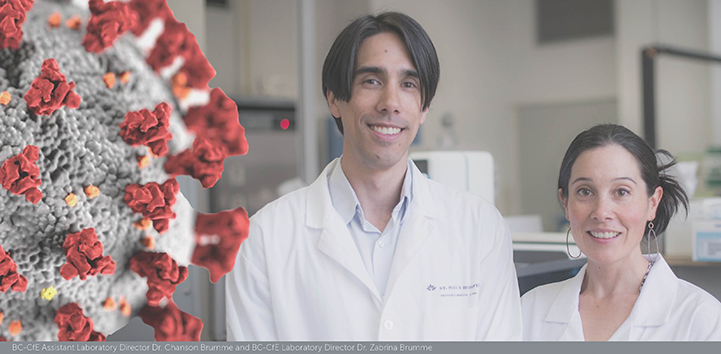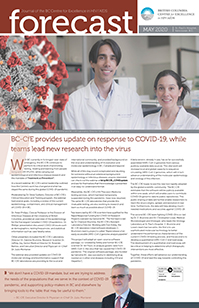
With BC currently in its longest-ever state of emergency, the BC-CfE continues to perform its critical work of promoting testing, treating and learning from people living with HIV (PLHIV), while carrying out epidemiological and infectious disease research and the mandate of Treatment as Prevention.
In a recent webinar, BC-CfE’s senior leadership outlined how the Centre’s work has changed and what has stayed the same during this global COVID-19 pandemic.
Moderated by Dr. Silvia Guillemi, Director of BC-CfE’s Clinical Education and Training program, the webinar had several goals, including a review of the current epidemiology, containment, and clinical management of COVID-19 in BC.
Dr. Peter Phillips, Clinical Professor in the Division of Infectious Diseases at the University of British Columbia, provided an overview of the epidemiology for the five largest Canadian COVID-19 epidemics. Dr. Phillips’ presentation discussed COVID-19 issues such as demographics, testing frequencies, and statistical information such as case fatality ratios.
Other presenters included the BC-CfE’s Laboratory Director Dr. Zabrina Brumme, Research Scientist Dr. Jeffrey Joy, Senior Medical Director Dr. Rolando Barrios, and Executive Director and Physician-in-Chief Dr. Julio Montaner.
The webinar also provided updates on COVID 19 molecular virology and bioinformatics support BC-CfE laboratories are providing to the local and international community, and provided background on the virus and understanding of its evolution and molecular epidemiology in BC, Canada and beyond.
While this may sound complicated and daunting for someone without an extensive background in epidemiology or infectious diseases, anyone interested can check out the webinar at bit.ly/BCCfE_COVIDupdate and see for themselves that the knowledge is presented in an easy-to-understand format.
Meanwhile, the BC-CfE’s HIV Precision Medicine testing services, which had been temporarily suspended during this pandemic, have now resumed. The same BC-CfE laboratories that provide this invaluable testing, are also working to research and learn as much as possible about COVID-19.
Two teams led by BC-CfE scientists have qualified for the Rapid Response Funding for COVID-19 Research Projects overseen by Genome BC. The first team is led by Dr. Chanson Brumme, the BC-CfE’s Assistant Laboratory Director. Working with Don Kirkby, the BC-CfE laboratory’s lead software developer, C. Brumme’s team’s project is called “Rapid release of an easily accessible SARS-CoV-2 genome analysis pipeline”.
This project will adapt an open-source software package, co-created by Kirkby and former BC-CfE scientist Dr. Art Poon, to analyze genetic data from SARS-CoV-2, the virus that has caused the COVID-19 pandemic. The original software package, also funded by Genome BC, was successful in identifying drug resistance in other viral diseases including HIV and Hepatitis C.
A beta version, already in use, has so far successfully assembled SARS-CoV-2 genomes from various publicly-available data sources. This vital work will increase local and global capacity to sequence circulating SARS-CoV-2 genomes, which will in turn advance understanding of the molecular epidemiology and virology of this infection.
The BC-CfE hopes to see this new tool rapidly adopted by the global scientific community. The BC-CfE estimates that the software will be publicly available within one week, which will enable users to contribute COVID-19 genomic data to public repositories. This public sharing of data will further enable researchers to track the virus’s origins, spread, and evolution in real time. Furthermore, the data will help develop much-needed medications and vaccines against COVID-19.
The second BC-CfE team fighting COVID-19 is co-led by Dr. Z. Brumme and Dr. Christopher Lowe, Medical Microbiologist and Virologist, who leads the Virology Laboratory at St. Paul’s Hospital. Z. Brumme and Lowe’s team has two aims: the first is to use sophisticated molecular technology to better understand the performance characteristics of the current COVID-19 testing process, and the second is to develop a quantitative SARS-CoV-2 viral load assay. The development of a quantitative viral load assay will be critical in helping to determine which therapeutic interventions are most effective.
Together, these efforts will advance our understanding of COVID-19 and lead the way towards controlling this pandemic.

